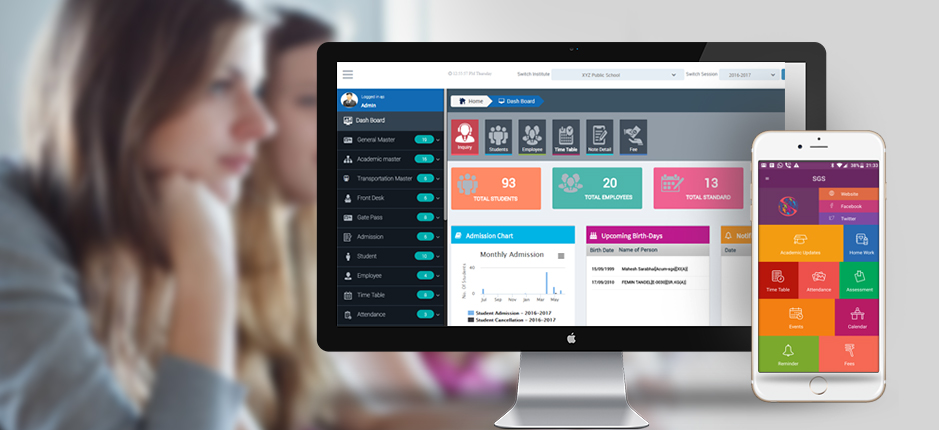Introduction:
School management systems have become an essential tool in modern educational institutions. Their advanced features and functionalities can bring about a significant positive impact. This article will explore eight key ways school management systems can make a real difference and transform the educational landscape.
1. Streamlining Administrative Tasks:
One of the primary benefits of a school management system is its ability to streamline administrative tasks. Manual attendance management, timetable creation, and report generation can be time-consuming and error-prone. However, with a school management system, these tasks can be automated, saving valuable time for teachers and administrators. It allows them to focus more on core educational activities, improving overall efficiency and productivity within the school.
2. Enhancing Communication :
Effective communication is crucial for the smooth functioning of any educational institution. School management systems offer various communication channels, including parent portals, messaging systems, and notifications. These platforms enable seamless communication between teachers, parents, and students, facilitating quick and transparent information exchange. Improved communication leads to better collaboration, timely updates on student progress, and enhanced parental involvement, ultimately fostering a supportive and engaging learning environment.
3. Student Information Management:
Managing student information is a complex task for schools. School management systems simplify this process by providing a centralized database to store and collect student information. All data can be easily accessed and updated, from basic details like contact information and attendance records to academic performance and disciplinary history. This comprehensive student information management system ensures accurate and up-to-date records, aiding in better decision-making and personalized student support.
4. Efficient Exam and Grading Management:
School management systems offer features to streamline exam and grading processes. Teachers can create, schedule, and manage exams digitally, reducing paperwork and minimizing errors. Additionally, automated grading features facilitate faster and more accurate result generation. The system can generate comprehensive reports and analyses, allowing teachers and administrators to identify areas of improvement and provide targeted interventions for individual students or groups.
5. Timetable Management:
Creating timetables is a complex task that requires careful consideration of various factors, including subject requirements, teacher availability, and student preferences. School management systems simplify this process by automating timetable generation. These systems consider all constraints and preferences to create optimal timetables that minimize conflicts and ensure efficient utilization of resources. This results in well-organized schedules, reducing disruptions and enhancing the learning experience for both students and teachers.
6. Financial Management and Fee Collection:
Managing finances is a critical aspect of running an educational institution. School ERP software offer modules for financial management, including fee collection, expense tracking, and budgeting. These features enable efficient fee collection through various payment modes, reducing administrative overhead and improving financial transparency. With accurate financial data at their fingertips, administrators can make informed decisions and allocate resources effectively, ensuring the economic health and sustainability of the school.
7. Attendance and Leave Management :
Maintaining accurate attendance records and managing leave requests are essential for monitoring student and staff attendance. School management systems provide digital attendance tracking, making recording and tracking attendance easier. Additionally, automated leave management features streamline the process of requesting and approving leaves, reducing paperwork and eliminating manual follow-ups. It enhances attendance monitoring, promotes punctuality, and enables timely intervention for students with attendance issues.
8. Data Analytics and Reporting:
School management systems collect vast amounts of student performance, attendance, behavior, and more data. Analyzing this data provides valuable insights into student progress, identifying strengths and weaknesses, and guiding instructional strategies. School management systems offer robust reporting and analytics features, allowing administrators and teachers to generate comprehensive reports and visualizations. These reports enable evidence.
In conclusion, school management systems have the potential to revolutionize the educational landscape in numerous ways. These systems offer significant advantages by streamlining administrative tasks, enhancing communication, and efficiently managing student information, exams, timetables, and finances. They also facilitate better attendance and leave management, enabling powerful data analytics and reporting. With their comprehensive features, MyClassboard’s school management systems empower educational institutions to operate more efficiently, improve student outcomes, and foster a collaborative and engaging learning environment. Embracing these systems can make a real difference by transforming how schools work and enhancing the overall educational experience for students, parents, teachers, and administrators. It is evident that school management systems are crucial tools in the digital era and play a pivotal role in shaping the future of education.



